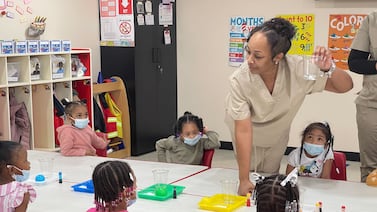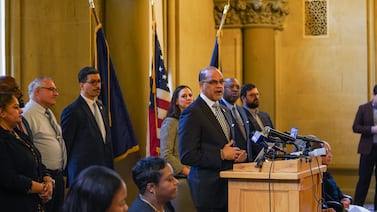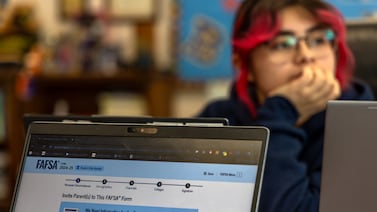U.S. Education Secretary Miguel Cardona said he is “totally against” any private school voucher program, like the kind Pennsylvania’s governor publicly backed this year, until public schools receive the state dollars they are owed.
“The moment public schools are fully funded, we could have that conversation,” Cardona told Chalkbeat at a Monday event in Philadelphia about career and technical education. “Right now, I am totally against any public education dollars going to private school vouchers.”
Cardona’s comments could underscore a political risk for Pennsylvania Democratic Gov. Josh Shapiro. His support for a state-backed school voucher program has boosted his national profile and fueled rumors he may be eyeing higher office. Yet that position also leaves Shapiro out of step with much of the Democratic Party and officials like Cardona, who has argued that vouchers are backed by those seeking to undermine public schools.
This summer, as part of a budget deal he cut with legislators, Shapiro vetoed a $100 million statewide voucher proposal he supported. But he said the so-called Pennsylvania Award for Student Success Scholarship Program, or PASS, is “unfinished business.”
Shapiro has said he believes something like the PASS program could work without siphoning funding away from the public school system. But critics like the Philadelphia Federation of Teachers have called vouchers a “misguided push to divert public dollars into private institutions” and “a distraction that diverts us from our collective responsibility to truly invest in public education.”
In February, a Commonwealth Court judge declared Pennsylvania’s school funding system unconstitutional because it creates unjustifiable disparities between low-wealth and high-wealth districts, and ordered the state General Assembly to revise it. As state attorney general, Shapiro wrote a brief in support of the plaintiffs in the funding lawsuit, and his 2022 gubernatorial campaign said he “would not sign a bill that takes funding away from public schools.”
The state’s Basic Education Funding Commission is currently conducting a series of hearings to begin the process of rewriting the formula.
If Shapiro heeds Cardona’s message, it may mean waiting to resurrect the PASS voucher program until the state reworks its school funding formula.
A spokesperson for Shapiro did not immediately respond to a request for comment on Monday.
At the event on Monday — billed as a roundtable discussion about career and technical education with district, workforce, and union leaders — Cardona also said he’s encouraged by the workforce partnerships he’s seeing in the city.
Become a Chalkbeat sponsor
“All the stars are aligning here for an opportunity for the students here in Philadelphia that maybe didn’t exist before,” Cardona said.
Meanwhile, state lawmakers are still considering whether to add $120 million in funding — along with new transparency measures — for Pennsylvania’s two statewide private school choice programs, the Opportunity Scholarship Tax Credit and Educational Improvement Tax Credit. Those programs are currently funded at $340 million together.
State law prohibits the collection of information about the academic achievement of students who benefit from these programs, making it difficult to judge their impact.
Carly Sitrin is the bureau chief for Chalkbeat Philadelphia. Contact Carly at csitrin@chalkbeat.org.







